"Summer Stock in Times Square": J2 Spotlight at 5 Years
J2 Spotlight Celebrates 5 Years of Delivering Thrilling, Rarely Seen Shows
Last weekend I saw a production of John Kander and Fred Ebb’s Zorba! at the AMT Theater, 354 W. 45th, between 8th and 9th (just east of Schmackary’s). I’d never seen the show, and I was expecting basically a Greek Fiddler, Zorba affable and charming like Tevye, in a story with some emotional meat on the bone, but fundamentally joyful.
There is joy to be found in Zorba!, and there is definitely some weighty emotional material. But this frequently dark story about the often mean-spirited people of a small Greek mining town, and a nomad who is a charmer for sure, at times, but also, philandering, manipulative, and sometimes wise, is definitely not Fiddler. Death and loss hang over the show almost from the beginning, and punctuate the second act with moments and songs as compelling and disturbing as anything you might find in Kander & Ebb’s Cabaret. Honestly, I found myself wondering whether I hadn’t just seen their rawest, most experimental, and perhaps finest work.
Like Smile, which I wrote about recently, this haunting production of Zorba! is the work of J2 Spotlight Musical Theater Company. Guided by co-founders Jim Jimirro (creator and founding president of the Disney Channel) and Robert W. Schneider (who has spent his life directing and producing theater, including a lot of great shows at 54 Below, and co-hosts the Behind the Curtain: Broadway’s Living Legends podcast), J2 has made a name for itself producing rarely seen Broadway shows. And unlike most off-Broadway companies, it somehow manages to do its two- and three show-seasons in a tight time frame of 4-6 weeks.
2025 marks J2 Spotlight’s 5th anniversary season. The company is concluding its season over the next two weeks (starting tonight) with Drat! The Cat!, a 1965 Ira Levin and Milton Schafer musical comedy about a female jewel thief and the cop trying to arrest her. It closed after 8 performances, but Stephen Sondheim once praised its lyrics as “expert and charming.”
I spoke to Jimirro and Schneider via Zoom last week about the company and its unique mission to give audiences today “the closest experience” to the original production.
This interview has been edited and condensed for clarity.
Rob, as artistic director do you direct all the shows?
Robert W. Schneider.
Robert Schneider: Usually. There’s been a couple seasons where I haven’t. Our first season I only did one, and our third I didn’t do The Goodbye Girl. But I directed all the rest. I love it.
Smile was great. I don’t know how you had so much happening—and happening so smoothly—on that stage.
RS: Our choreographer Caitlin Belcik is a genius. I don‘t know how she does it, but she does it beautifully.
I’m very lucky. She choreographed the first show we ever did at J2, and then she’s been with us every single season since, except last year, when she was onstage and not choreographing for us, because she’s a brilliant actor as well.
Your productions are back-to-back-to-back. So are you rehearsing multiple things at the same time?
RS: Yeah. For example Smile will rehearse 5-11pm and then in the mornings we’re doing Zorba 11am to 4pm. Then when a Smile performance is running, Drat! The Cat! starts. So 11 to 4 will still be Zorba, but then 5 to 10 will be Drat while Smile is playing here. We call ourselves “Summer Stock in Times Square”, and it feels like it. It’s fun!
Jim Jimirro: I think Rob likes the puzzle of being able to figure out how to do a show that’s supposed to be 30 people and a 30-piece band on a large stage in a small room. He enjoys the challenge.
RS: I do.
On your website, you say you came up with J2 “over omelets and BLTs at the Apple Jack Diner.”
JJ: I’ve been a musical theater aficionado all my life, from the outside. I was never involved, I was involved in television and the movie business in Los Angeles. But I’ve loved musical theater, I’ve loved it all of my life and it’s meant a great deal to me.
When I sold my company, I had in the back of my mind to do something in musical theater, because I’m so passionate about it. Rob was directing a staged reading of The Happy Time at 54 Below. A friend of mine was in it, and I was very impressed. So I invited Rob to lunch. And we didn’t really talk about the project for the first hour and a half. We talked about musicals. What about that song? What about that score? Do you like that? You know how that works with two musical theater buffs, you get together all you want to talk about is musicals.
I think in the last 5 minutes I asked, Do you want to do something?, and we had a handshake. That was toward the end of 2019. We put it together very quickly: We had our first show in the winter.
From the beginning was your idea to revive shows that are rarely seen?
Jim Jimirro
JJ: Yes. For me, it was trying to bring alive these things that I love so much. I saw the original cast of Zorba. I saw the original cast of Sugar, of Do Re Mi. I want other people to be able to see these things, and see what I saw in them.
When we started, we each came up with a list of shows we wanted to do. I think my list was 150, and Rob’s was 175. A lot of them were duplicates, of course, but a lot of them weren’t. So far, up to and including Zorba we’ve done 12, and every one of them has been a joy to revisit. Every one.
Especially in terms of what’s happening today—This is my bias, but I think these shows are so much better than what we have today from a craft point of view. The playwriting is more exacting, the harmonies are more complicated. They’re just better crafted. I’m not saying they’re more artistic. Somebody else can judge that. But I know they’re better.
When you listen to the lyrics that Ashman wrote for Smile, the only tragedy is that they go by so fast, you don’t fully understand the brilliance of them. It’s very, very hard work.
How would you each describe your sensibilities in terms of the kinds of shows that you’re interested in doing?
JJ: I think I’m a discriminatory person, but I don’t think I’m discriminatory when it comes to musical theater. I just love it. Somebody was trying to tell me the other day how Julie Harris wasn’t a very good singer in Skyscraper. And all I could remember was I just loved Skyscraper: I loved the score, I loved that music, I loved her. But that’s me, I’ve always been that way.
RS: I’m the same. You put me in front of a musical and I’m happy. If I could direct every musical that was ever created, I don’t think I’d turn any down.
The only thing that I try to keep in my mind as Jim and I are talking about shows is: Is there something that I’ve heard New York audiences say that they would love to either see for the first time or revisit? That’s usually something that helps guide us. For example on Smile, it was a show I had never seen until I directed it, but I knew it was something that a lot of New York audiences had wanted to see. So that percolates as Jim and I are pitching show ideas back and forth to each other.
What’s been really exciting is now we’re getting people coming to us that are not just from New York but all over the country and the world. I had somebody from Germany fly in because they were a huge Howard Ashman fan and they loved Smile. We have people from all over that are making J2 a destination spot to scratch their theater, which is kind of amazing.
The cast of J2 Spotlight’s Smile.
JJ: I was sitting next to this woman who said she had just flown in the day before from Sydney. She had purchased 18 tickets to go to Broadway shows in advance of the 21 days she was going to be here. Of the 18, J2’s Smile was the first thing she saw.
Now, we’re not exactly famous in Australia. *laughs* So I asked her, how did you find out about Smile? Well Rob does a podcast, and she heard that. So she saw 17 Broadway shows and Smile. It’s amazing.
Do you get people suggesting shows they would love for you would do?
RS: Oh yeah. I don’t think there’s a performance that goes by that someone doesn’t corner Jim over in the lobby and say, hey have you thought about this?
JJ: It’s its own kind of wonderful. These are people who love this stuff just like we do.
RS: I like when people give us recommendations. It’s good to hear what people want to see again. It’s also nice to be validated. If someone says, you should be doing Zorba, and we know that’s been on our list for a while, we know at least one person will come see it! *laughs*
There are a number of companies that focus on bringing back older stuff—City Center Encores; York Theatre; some of the programs you’ve started at 54 Below, Rob. And yet somehow J2 always feels like it has its own special niche.
RS: One of the things that I think is important is that we’re presenting these shows as originally intended by the authors. When we do something we don’t make changes to it unless the authors make a specific request. We do it as purely as possible. We’re not there to reinvent the wheel, we’re not there to rewrite the show. There are other companies that do that, and they do it really well, but that’s not us. Our goal is to give you the closest experience to what you would have seen of Zorba in 1968 when it opened originally. That’s important for us.
JJ: I think that’s a hallmark of what we try to do here. Other people like to reimagine things, and that’s fine. But we prefer calling attention to what happened at that point of time.
That approach makes for some really interesting experiences. In Smile, there’s the big photo reveal at the start of Act II which completely changes the direction and tone of the show. And it’s a really hard turn. I wondered watching it, why isn’t this at the end of Act I?
RS: This is what the author’s original intentions were. And erasing history or trying to act like things didn’t happen, I don’t see the benefits of that. If you are uncomfortable by it, that’s good. It’s good to see how far we’ve come in certain things.
I don’t want to speak for the company and I don’t want to speak for Jim, but I feel the more erasure you do, the more damage is done because then you forget the past. So yeah, that was the author’s intentions, so we’ll do it.
Are there kinds of shows or authors you haven’t tackled until now because you weren’t sure you were ready for, or you wanted time to grow toward?
JJ: I think the answer is probably no. We have done musicals already that were not on that original list, but I don’t think there’s any growth.
One of the problems that we have is that it’s a little more difficult to get the licenses of the things we want to see than it is even across the river. So certain things that we want to do so badly, we keep asking every year hoping that maybe the tide will turn this time. But I wouldn’t say there’s been any evolution at all in what we’re ready to do now versus three or four years ago.
RS: We’ve also been very lucky in that if we’re working on a piece and the authors are still alive, they work hand in hand with us. Which has been really, really lovely.
So when you did Lucky Stiff, were Ahrens & Flaherty have been involved?
The cast of J2 Spotlight’s production of Ahrens & Flaherty’s Lucky Stiff.
RS: Oh, through everything. They were involved on casting. We rehearse 6 days a week; they were probably at 3 rehearsals a week with us. They were at tech. They were at previews. And they really beat the drum for us in terms of marketing and publicity. They called in a lot of favors.
And what’s kind of cool [is], the version that we created at J2 is now the version that they license. So if anybody wants to do Lucky Stiff from now on, they’re going to get the same score and script that we used, based on the changes that the authors made after seeing our production.
That’s great.
RS: I think so too. It’s a big thing we’re proud of. We take care of writers and we take care of the writers’ intentions.
And what’s been really wonderful is the authors who have worked with us have told other authors, They do it purely, they honor the work. And that’s opened the doors to other major writers coming to join the party.
JJ: Stephen Schwartz is another who has been involved with us. We did The Baker’s Wife. And it’s an interesting thing—Stephen had a love for Baker’s Wife and always felt that it was never given its due. (I think the same thing is true of John Kander and Zorba!) And I think he looked at Rob and the creative team as a way to maybe finally get this right. He was very involved with Rob and his team. And at the end, he came to me and said, “Thank you for burnishing my musical.”
Jim and Ajchara Jimirro, Robert W. Schneider and The Baker’s Wife composer Stephen Schwartz.
Also, you can imagine what it’s like for these young talented geniuses that we have on our stage to be getting notes from the likes of Steve Flaherty and John Kander.
So John Kander was involved with Zorba, as well?
RS: He had casting approval, he came to a rehearsal, he watched a run through and I believe he’s coming on Saturday night to see the performance. He’s been wonderful. And also very wonderful about saying, Listen, this is the version of the show that I want to do, this is what I want to include, this is what I don’t want to include. All of the writers who have worked with us, they’ve been wonderful to us, and Mr. Kander is no exception.
In the five years you’ve been doing J2, would you say you’ve had any big discoveries or unexpected surprises?
JJ: We have a tremendous amount of talent in Los Angeles, but I made the decision that I wanted to do this in New York, for two reasons. One, this is ground zero for musical theater. And two, I wanted to go back to the place where I learned to love musical theater. And I think the revelation for me and frankly also a source of melancholy is the depth of amazing young talent in this city. I wasn’t prepared for that.
I’ve learned to love so many of these people, but I also am melancholy, because I know how hard it is. I know how much competition there is. I console myself that we are giving a lot of young wonderful people a lot of work, even if we can’t give work to everyone we’d like to.
RS: I think one of the things that I’ve been happily surprised by is how much of a community of like-minded people there are out there like Jim and I and everybody over at J2, people who want to see these shows. Current Broadway doesn’t really reflect craft, in my opinion, not to diminish any work that people are doing. So the fact there was such a hunger for this, it’s been really, really wonderful to see. I did not know that there was a whole community out there with the same sort of artistic ethos as we have before we started this process.
Was it discovering that community which led you to start adding cabarets and talkbacks—actually, you have a special word for those programs, right?
JJ: We call them “lagniappes” [pronounced LAHN-yaps]. Lagniappe is a Cajun word from Louisiana meaning “extra bonus.” I used to do a lot of work in Louisiana with Chef Paul Prudhomme; that’s how I got to know it.
Rob and I felt that J2 is in a way a celebration of American musical theater. So if we can, we want to do things adjunct to that which enhance that celebration in other ways.
Also, for me as a business man as well as a musical theater lover, I’ve always been lucky enough to work for companies that cared about their customers, that wanted to give people the best possible experience, the best bang for the buck. Disney was that way to a fault. So I come from that point of view. If we can enhance people’s experience, if we can give them more, give them a broader experience for their money—and we try to keep our prices relatively modest compared to New York standards, too, it makes me happy.
You offer such an interesting variety of programs. For Smile, you did a cabaret of the songs Carolyn Leigh wrote before she passed away and Howard came on board, which I don’t think had ever been heard publicly.
You also had people coming in who were involved with the original production of the show, or who could give different kinds of context. It’s a great variety.
How do you come up with these topics?
RS: My good friend Jennifer Ashley Tepper wrote these amazing books called The Untold Stories of Broadway: Tales from the world’s most famous theaters. Jen to me is such a captivating speaker and such a wealth of information. So last season she came in and she did a lecture on the Martin Beck, where Do Re Mi opened, now the Al Hirschfeld, and then she did one on Playwrights Horizons. And we loved her so much we asked her to come back and do it again.
This year we also asked our good friend Ken Bloom, who’s a wonderful historian and great author, to talk.
Rob Schneider and Jennifer Ashley Tepper at 54 Below.
You also have Peter Filichia coming in to talk about the year Zorba! came out.
RS: Peter’s mind works in such an interesting way when it comes to statistics and numbers. You’ll say “1990” and he’ll go Oh yeah, this show opened on this date and this show on this date. And he’s seen all of them. It’s fascinating. So we asked him to come in and just talk about this particular season that Zorba opened. Because I think it’s important also to see, say for a show like Smile, you watch the show and you think This is such a good show, I wonder what was happening on Broadway at the time for it not to work. And Peter fills in those gaps. Smile opened the same year that Les Mis opened, it was the year Starlight Express opened, Me and My Girl opened. I think that’s clearly a main reason why Smile wasn’t as successful the first time. Those types of shows weren’t in vogue any more.
So I think it’s good to offer those kinds of programs to fill in those kinds of educational blanks.
They definitely add a whole other layer of depth to the experience.
RS: One of the things that’s really great about Jim is that he never lets anything grow stagnant. Every season he comes in with another idea, a bigger idea and a better idea, to just make the audience feel like it’s a whole experience. Every year we seem to layer on something we’ve never done before, which is really cool and exciting for the audience.
JJ: This year we added three new things. The music before each show is part of Show Tunes to Hit Tunes. Broadway is one of the three ways that people makes hit records, right—Broadway, Hollywood, and Tin Pan Alley. So while we’re playing say, Frank Sinatra singing “All I Need is the Girl” from Gypsy, we’ve got factoids on the screen about the history of Gypsy, and how Sinatra sang it, the Count Basie arrangement. We do four of those before each show. It’s really nice. You learn a little something about the song.
We’ve also two interactive lagniappes. We’re doing Name that Tune Broadway, and Broadway Trivial Pursuit. So the audience gets a chance to play.
We’ll keep trying to come up with things that not only give people a better experience and a richer experience, but enhance our own brand and separate us. Because there’s a lot of stuff going on in New York City!
Do you get positive feedback from the audience on doing these?
JJ: Very much so. We don’t get a majority of people who see the show to stay, but we get a substantial number, and they really appreciate it. And I’m perfectly fine with that. Those people have had an enhanced experience. It’s worthwhile doing for that.
I tip my hat to Rob, too. When you run anything, even a smaller theater company like this, there’s always going to be challenges and problems. That’s life. But it occurred to me when I think about J2, I never worry about the product. Rob always finds a way to make it work on that stage. He’s modest, but I have to say that. You take something as intense and as complicated and as deep as Zorba…it’s a tough show, a powerhouse of a dramatic piece, notwithstanding the amazing score. And I think the power and the essence of what’s contained in that material is really realized by Rob.
One of the things that’s really going to be interesting to me is to hear John’s reaction after he sees it on Saturday. He said to us that he loves Cabaret, he loves Chicago, he loves all his stuff, but he has an especially deep feeling about Zorba. He sent an email to everybody, he said “Zorba! means a great deal to me. And I hope it comes to mean a great deal to you.” It’s really touching to see.
Has he shared what it was about that show that has meant so much to him?
John Kander with the cast and creative team of Zorba!
RS: He did. When he was first approached about the show by Hal Prince, he wondered why they were doing it as a musical, it just doesn’t seem right. It didn’t feel like a musical. But after Hal Prince convinced him that it was going to be about both sides of life, the optimism and the darkness, leaning into the darkness, that’s when he and Fred Ebb really worked hard on it. It was one of those things where you don’t like something at first and then you really grow to love it, and then you wonder how could I ever have existed without it. That’s Zorba for them.
I’m sure I’m not articulating it as beautifully as him, but that’s the sense of it. They had just come off of Cabaret. How much further could they go?
I mentioned this on social media, and I really do believe it: Zorba does not get the appreciation that it deserves. It is a really strong bridge from Cabaret to Company. People talk about the “concept musical” or the “dark musical”, and they’ll list Cabaret, Company, Follies, Sweeney Todd. But Hal Prince said if it wasn’t for Zorba!, there wouldn’t be those shows.
They tried a lot of things in the original company that were very experimental, that audiences had never seen before. It really broke a lot of rules. The second act is so dark and pessimistic. And the lead character learns a lesson, but it’s a very tiny lesson. He doesn’t get a big 11 o’clock number where he sings Oh my God I’ve learned this about the world, or I’m going to be more like Zorba. It is dark, it is sad. But it’s about life, and how you have to appreciate the bad things that happen to you in order to really appreciate the good things. I think there’s a tendency in humanity to dismiss the bad things that happen to us. No, you need them. You need them. That was important to John Kander and Fred Ebb, and I think it’s important as we’re presenting this particular production.
He also mentioned, and he’s very open about this, so I don’t feel like I’m telling tales out of school—As the show evolved when it went on tour and then when Anthony Quinn did it in the ‘80s, it kept get softer, and it kept feeling more like a conventional musical, more buoyant and optimistic. And he didn’t like that. Producers kept throwing a lot of money at John Kander and Fred Ebb to sort of look the other way, and he has said it was very easy to take a nice, big paycheck and look at something else. But it’s something he’s really regretted.
I think to him, this is going to be the purest version of the show he’s ever seen. Because it’s what he wants it to be.
Last question: What can you tell me about Drat! the Cat!, which opens today.
JJ: I never saw the show, I don’t anybody who did. But I did get that 1998 studio recording and I fell in love with that score. I’m excited. It’s going to be a fun show.
RS: This thing only ran 8 performances but somehow got a hit tune out of it, Barbra Streisand’s song “He Touched Me.” She was married to Elliot Gould at the time, and Elliot Gould was the star of the show. I think people are going to be surprised that in the show, the song is actually “She Touched Me”, and it’s sung by the male lead.
When we first talking about it, I remember thinking, It only ran 8 performance, it’s probably not going to be a very good script. I was so wrong. I wish we could give the audience a copy of the script to read along, because even the stage directions have laughs in them.
One of the things that excited us is that it is really good material. Why the show is not being produced more is beyond us. I’m hoping that when we do it people will see this is viable, and more productions will sprout up places.
I always say, If you love film, and you’ve never seen Citizen Kane, I can give you the DVD. Or if you’ve never seen the Mona Lisa, great, I can take you to Paris, we can look at it. But a musical’s a different beast. If you read it, you don’t get a sense of its energy. If you listen to it, you don’t get a sense of its energy. You gotta see the whole thing.
So even if people go to see Drat! the Cat! and say, Eh, now I know why it only ran 8 performances—they won’t, but if they did—now you know. You’ve had your own experience of it.
The original Broadway production had like 45 people in it. We’ve reduced it to 6. *laughs* And I think the hope is that they’ll be licensing this version. If you like The Mystery of Edwin Drood, or you like Gentlemen’s Guide, it’s literally in the same vein. And funny, really funny.
I can’t wait to see it.
RS: We’ve been really lucky. A lot of the shows that I think were dismissed the first time, after we’re done with them people go Oh wow, this is a much better show than I thought. And that’s exactly what we’re trying to do.

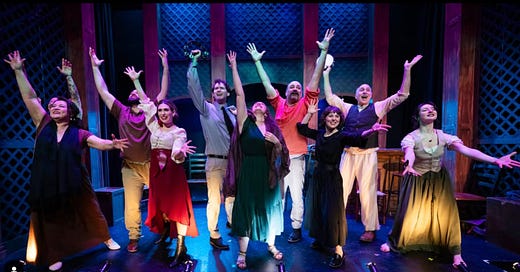



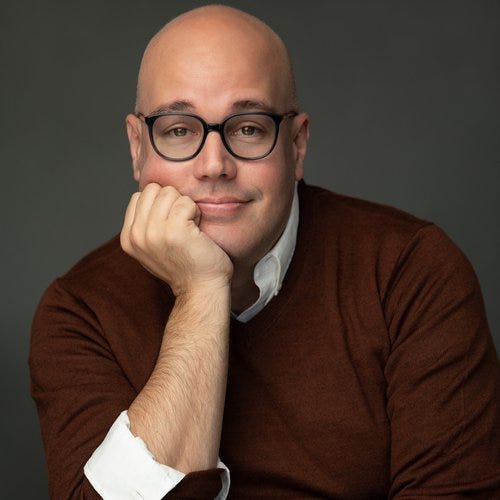
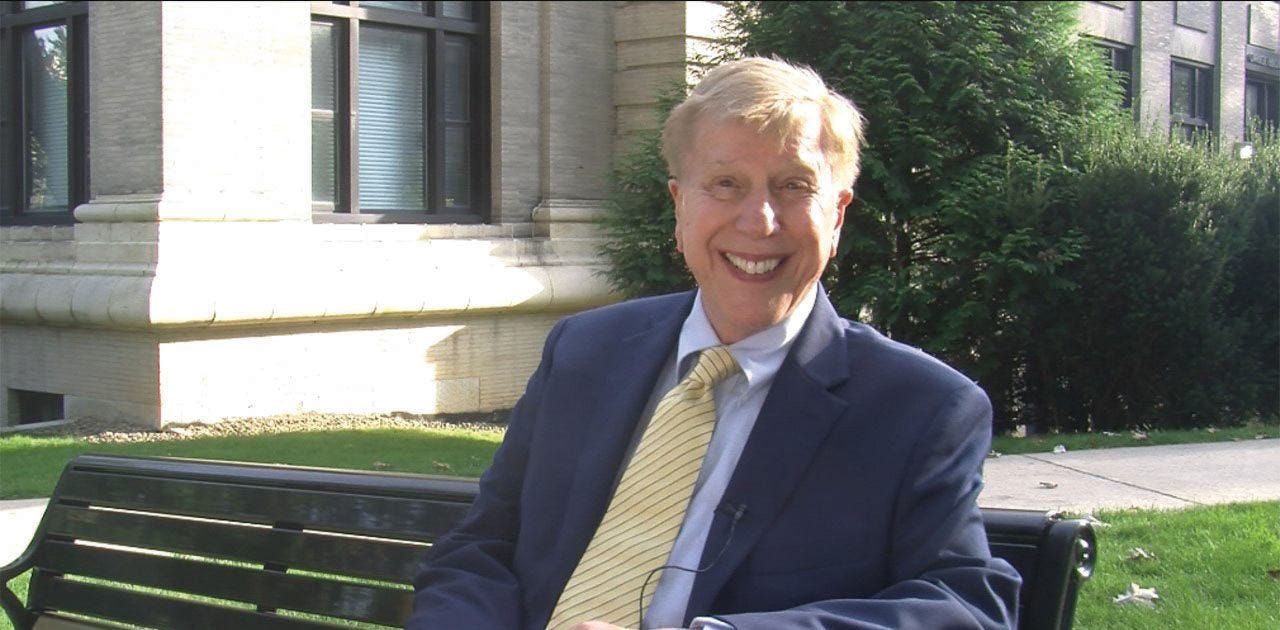
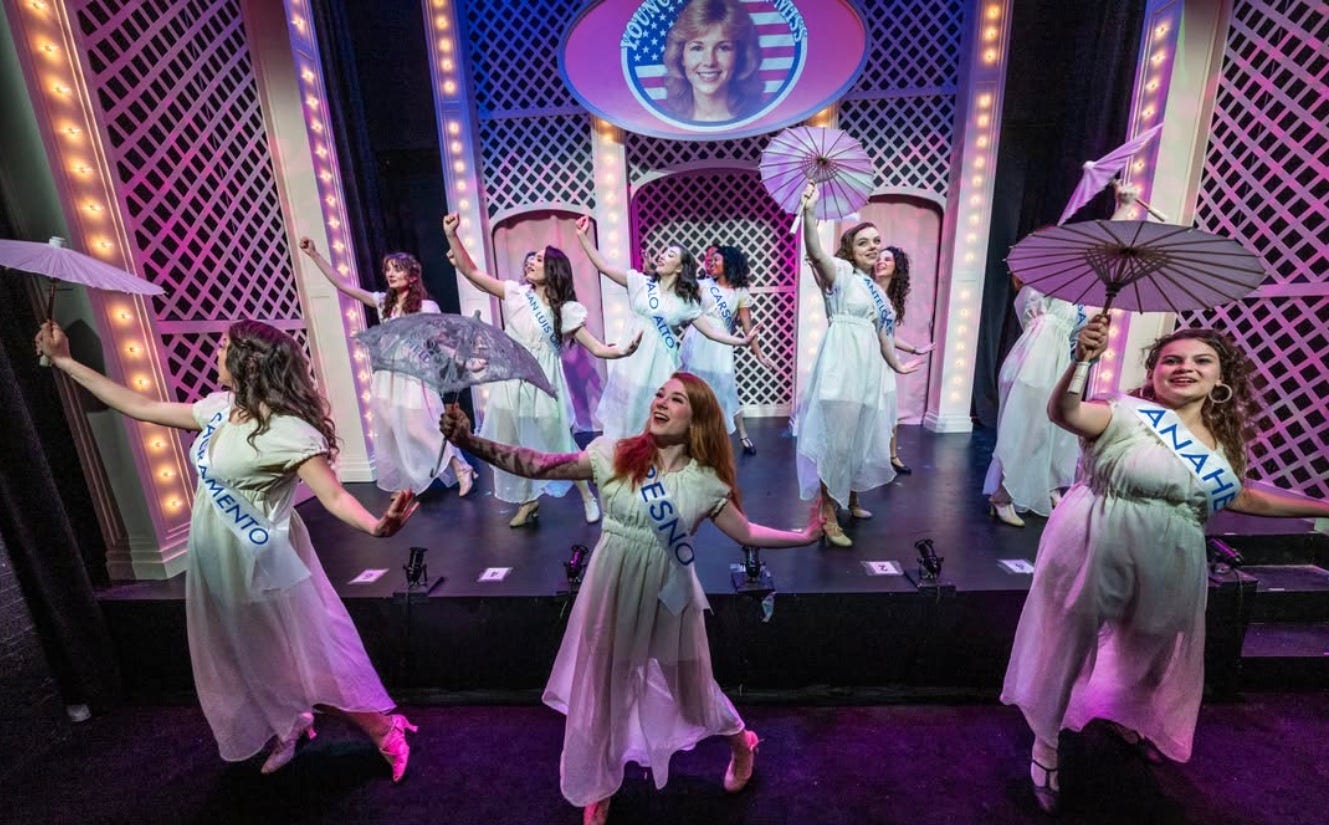
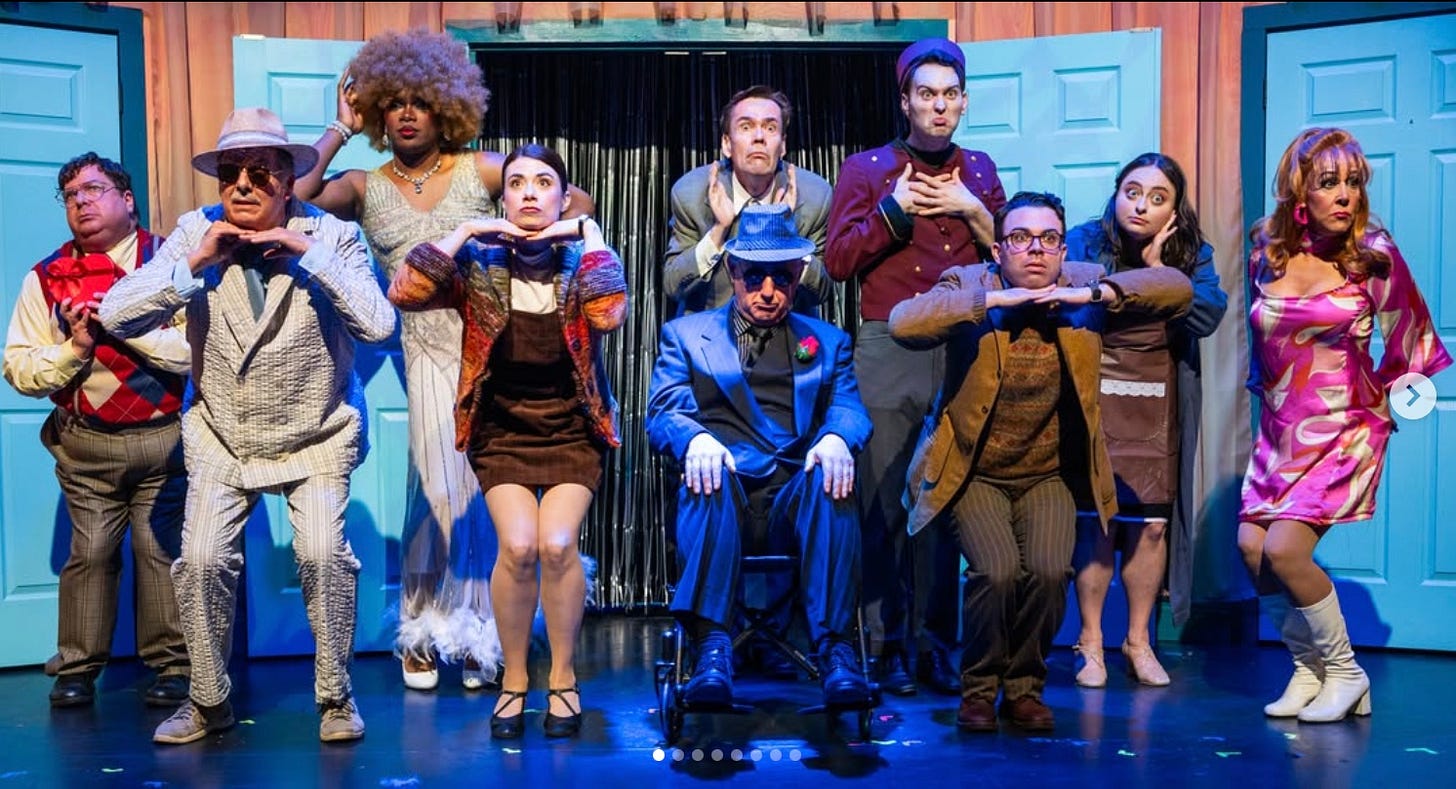
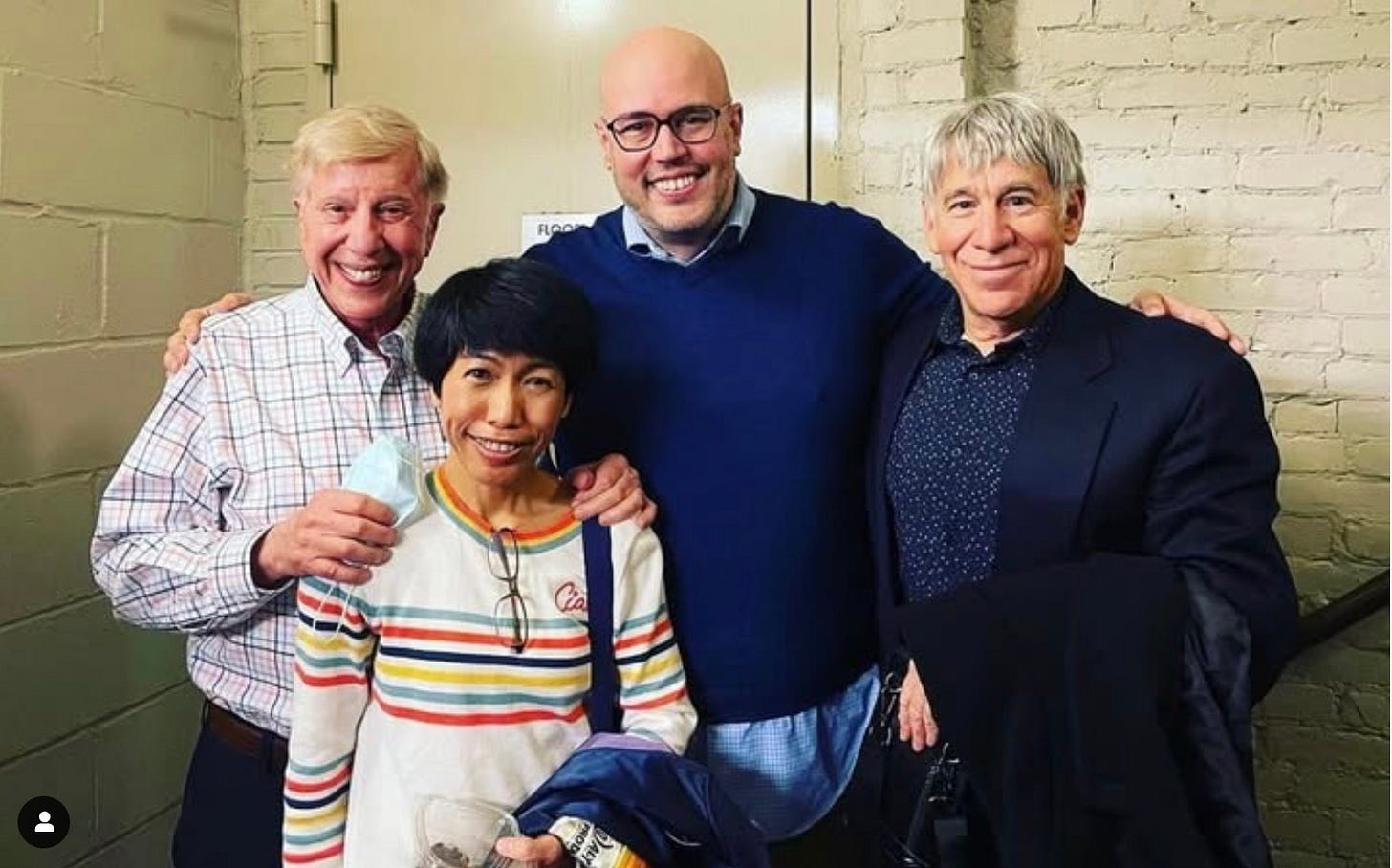
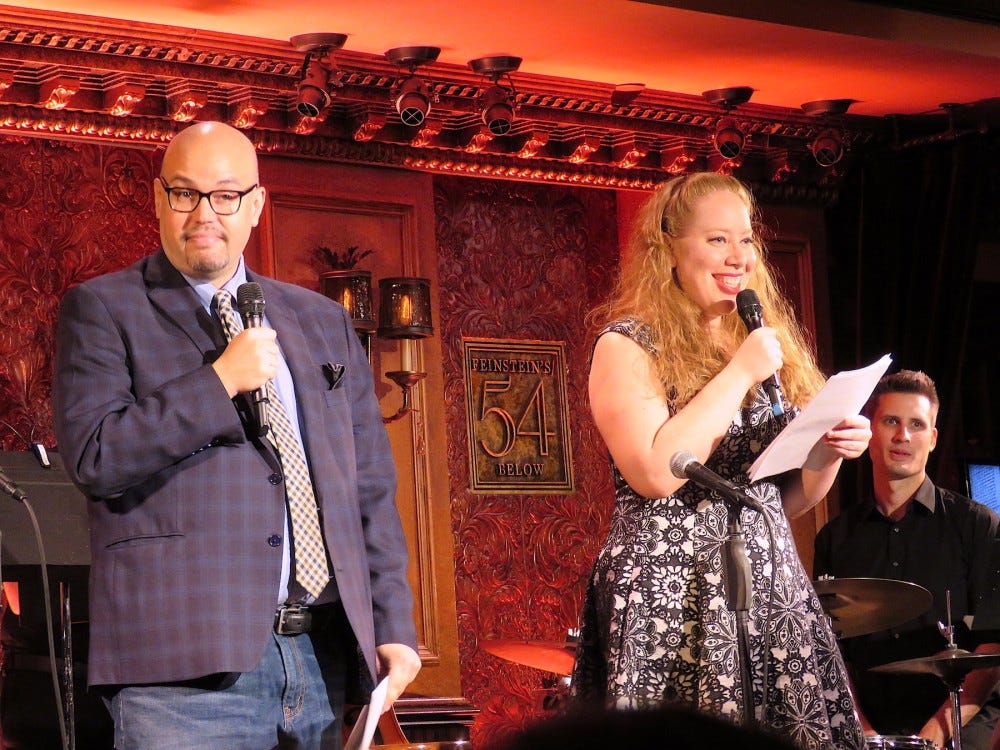
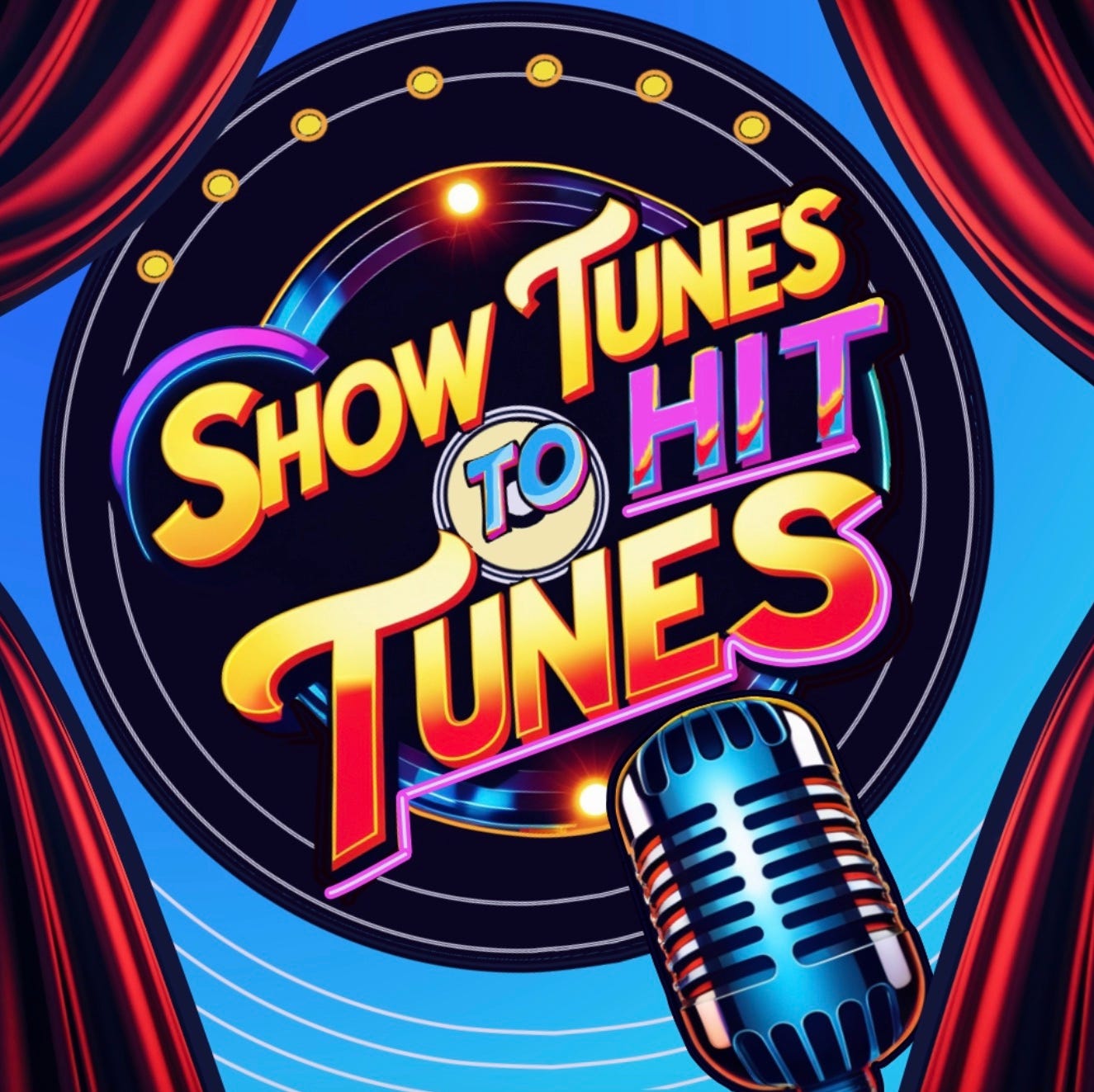
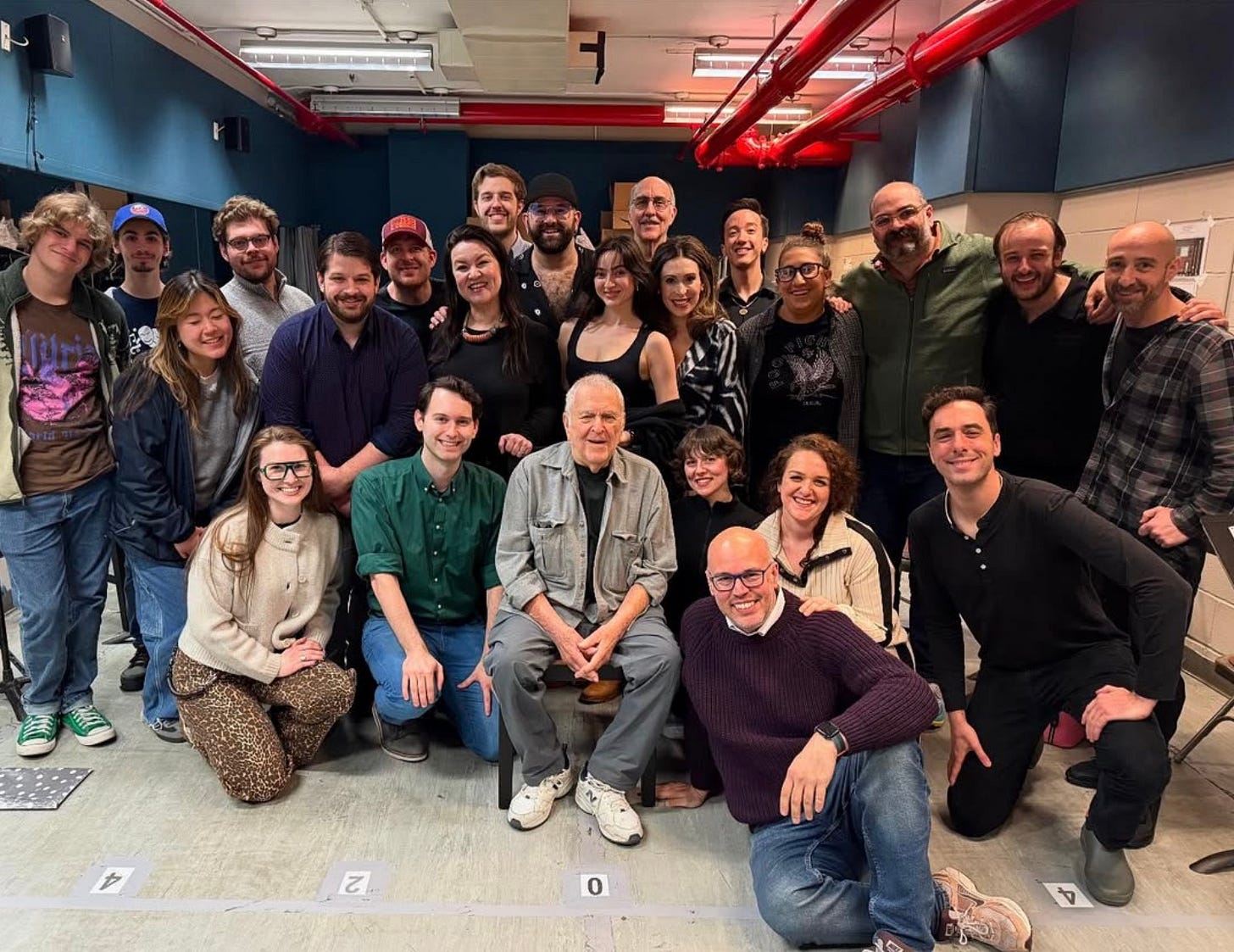
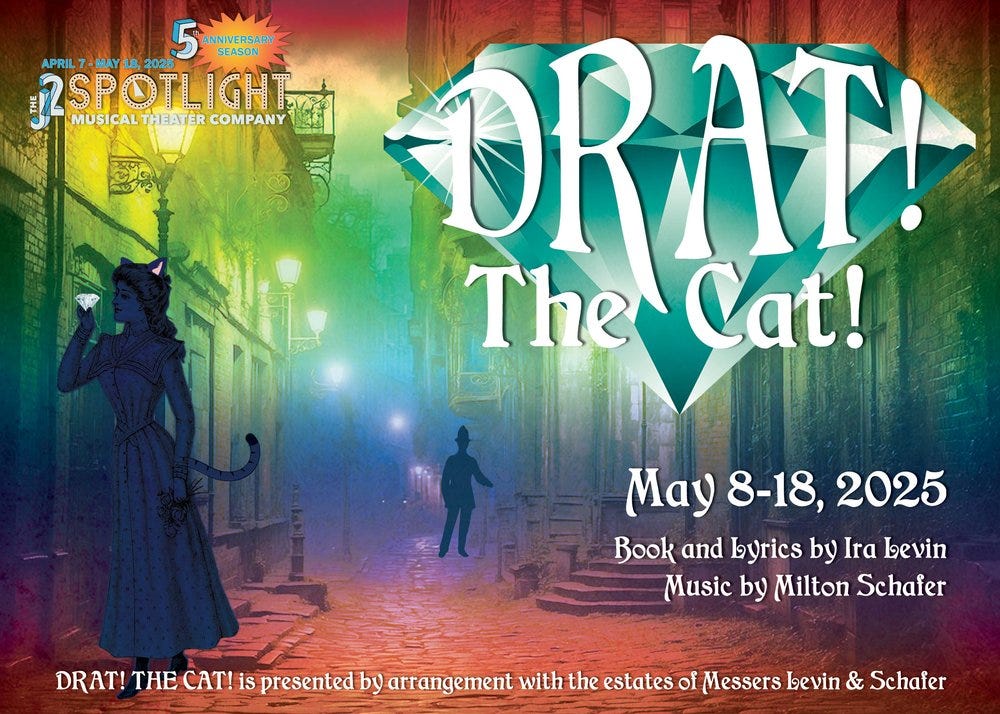
Would love to hear what you thought about Drat! the Cat!. Will you be writing a review?